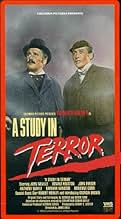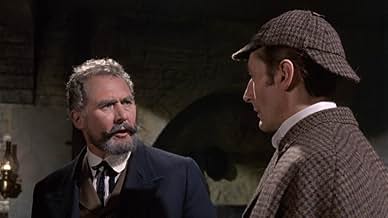NOTE IMDb
6,5/10
2,7 k
MA NOTE
Sherlock Holmes et le Dr John H. Watson se joignent à la chasse au tueur en série notoire, Jack l'Éventreur.Sherlock Holmes et le Dr John H. Watson se joignent à la chasse au tueur en série notoire, Jack l'Éventreur.Sherlock Holmes et le Dr John H. Watson se joignent à la chasse au tueur en série notoire, Jack l'Éventreur.
- Réalisation
- Scénario
- Casting principal
Avis à la une
I am both a fan of Sherlock Holmes and an interested observer of the case of Jack the Ripper. This film, with excellent show-saving performances by John Neville, Anthony Quayle, Robert Morley and the whole cast, was clearly written by a Sherlockian rather than a Ripperologist. A lot of Holmes's lines are lifted from stories in the original cannon. The fictional story here (where Holmes encounters Jack the Ripper) is good and basic, and I prefer the simplicity of its solution to the complexity of that in "Murder by Decree", the other Holmes-Ripper film, made in 1979. The research, however, on the Jack the Ripper crimes was clearly lousy, if not non-existent: From the first five seconds of the film, with Mary-Anne Nichols (nicknamed "Polly", but would The Times call her that?) having a knife stuck through her neck and seconds later a fat woman discovering her, when in reality, Nichols had her throat cut and her uterus torn out, two hours before she was discovered by two men. The "dear boss" letter is anything but complete here, there is no mention of the other letters or reasonable explanation for why the Ripper sent it. The writing on the wall for murder three is absent. Still, if you don't mind historical inaccuracies, this film is definitely worth watching. It has my approval.
Having just watched this film I thought I would add my penny's worth to IMDB.
I have to admit that I am a fan of Murder By Decree and there have been comparisons between that film and A Study In Terror. In my mind they are quite dissimilar.
A Study In Terror is what I would call a Sherlock Holmes film with the murders of Jack the Ripper playing second to the characters whereas Murder By Decree is a film about Jack the Ripper with Sherlock Holmes playing second to the murders and the plot. I think this is borne out in that Murder By Decree you could have actually had any two detectives investigating the murders and the film would have worked. A lot of attention is paid to the historical facts and the timing and places of the murders. In A Study in Terror the victims are 'cannon fodder' and the facts not that historically correct. There was no mention of the 'Jewes' message left on the wall after the infamous double murder and, although Mary Kelly was murdered indoors, it was in a ground floor room. That is not to say A Study In Terror is not a good film, it is. We have an instantly recognisable Sherlock in John Neville who plays the part well; the supporting cast are good in their own right to. Interestingly Frank Finley played Lestrade in both A Study in Terror and Murder by Decree and Anthony Quale also appears in both films but in different characters.
I cared more about the victims in Murder by Decree (especially the scene with Annie Crook in the mental institution) than I did A Study in Terror and I think that is why I like that film more. Still A Study in Terror will keep you interested and I would recommend both films but for different reasons.
I have to admit that I am a fan of Murder By Decree and there have been comparisons between that film and A Study In Terror. In my mind they are quite dissimilar.
A Study In Terror is what I would call a Sherlock Holmes film with the murders of Jack the Ripper playing second to the characters whereas Murder By Decree is a film about Jack the Ripper with Sherlock Holmes playing second to the murders and the plot. I think this is borne out in that Murder By Decree you could have actually had any two detectives investigating the murders and the film would have worked. A lot of attention is paid to the historical facts and the timing and places of the murders. In A Study in Terror the victims are 'cannon fodder' and the facts not that historically correct. There was no mention of the 'Jewes' message left on the wall after the infamous double murder and, although Mary Kelly was murdered indoors, it was in a ground floor room. That is not to say A Study In Terror is not a good film, it is. We have an instantly recognisable Sherlock in John Neville who plays the part well; the supporting cast are good in their own right to. Interestingly Frank Finley played Lestrade in both A Study in Terror and Murder by Decree and Anthony Quale also appears in both films but in different characters.
I cared more about the victims in Murder by Decree (especially the scene with Annie Crook in the mental institution) than I did A Study in Terror and I think that is why I like that film more. Still A Study in Terror will keep you interested and I would recommend both films but for different reasons.
In 1888, Sherlock Holmes (JOHN NEVILLE) and Dr Watson (DONALD HOUSTON) discover the identity of the Whitechapel serial killer known as Jack The Ripper.
An enormously enjoyable fictional confrontation between Conan Doyle's most celebrated detective and a true crime, which has caused constant fascination since it occurred over one-hundred years ago. The script writers Donald and Derek Ford came up with an excellent screenplay that succeeds in capturing all the eccentricities and intelligence of Sherlock Holmes and his solution to the Ripper killings are quite believable made up of many facts and myths that surround the case that looks never to be solved. Director James Hill who was more famous for his animal adventures with BORN FREE (1965) and his attempt to take swinging sixties pop to the seaside in EVERY DAY'S A HOLIDAY (1964) shows that he was a most versatile film maker who could generate excellent suspense and disturbing horror sequences. Just check out the last killing which is brilliantly shot from the Ripper's point of view with hand held cameras (presumably!) and gaudy lighting saturated in lurid reds. Hill recreates the Victorian London era with great enthusiasm and he is most ably assisted by cinematographer Desmond Dickinson (who is this author's favourite cameraman) and there are first rate performances from Neville as Holmes and Robert Morley as his brother Mycroft. There is a classic scene where Holmes is probing a clue over his violin and Mycroft asks "Why in all these years have you never learned to play that infernal instrument?".
An enormously enjoyable fictional confrontation between Conan Doyle's most celebrated detective and a true crime, which has caused constant fascination since it occurred over one-hundred years ago. The script writers Donald and Derek Ford came up with an excellent screenplay that succeeds in capturing all the eccentricities and intelligence of Sherlock Holmes and his solution to the Ripper killings are quite believable made up of many facts and myths that surround the case that looks never to be solved. Director James Hill who was more famous for his animal adventures with BORN FREE (1965) and his attempt to take swinging sixties pop to the seaside in EVERY DAY'S A HOLIDAY (1964) shows that he was a most versatile film maker who could generate excellent suspense and disturbing horror sequences. Just check out the last killing which is brilliantly shot from the Ripper's point of view with hand held cameras (presumably!) and gaudy lighting saturated in lurid reds. Hill recreates the Victorian London era with great enthusiasm and he is most ably assisted by cinematographer Desmond Dickinson (who is this author's favourite cameraman) and there are first rate performances from Neville as Holmes and Robert Morley as his brother Mycroft. There is a classic scene where Holmes is probing a clue over his violin and Mycroft asks "Why in all these years have you never learned to play that infernal instrument?".
This is a model B-movie: fast-paced, engaging, atmospheric, full of great twists. Most "A" productions would only wish they were this good! Neville makes a suitably arrogant and surprisingly physical Holmes, and Houston is a perfect Dr.Watson. The director does wonders with an obviously low budget. Much, much better than the similar "Murder By Decree". (***)
The two big crimefighting superheroes of the middle 60s were James Bond,and Batman.I think that the cultural miliue that was going on had a significant influence on the way that these films and tv programs impacted this film.It is an interesting and respectable addition to the Holmes canon.And while neither Neville as Holmes nor Huston as Watson do more than imitate Rathbone and Bruce,they do what they need to do with honors.What I found fascinating was the casting of Morley as Mycroft Holmes.A physically appropos choice(Mycroft is described as mildly obese,balding,untidy,and indolent)Morley also suggests the powerful intellect and penetrating insight that Mycroft possesses.And even if he does add some rather stuffy,pompous,and overly fussy comic relief,what of it?The movie does benefit,and it "fleshes out"(forgive the pun,given Morley's size)Mycroft's eccentric personality.
Le saviez-vous
- AnecdotesSir Arthur Conan Doyle never wrote a story in which Sherlock, a fictional character, worked on the real-life Jack the Ripper case. However, Dr. Joseph Bell, the real-life inspiration for Holmes, was consulted by Scotland Yard on the case.
- GaffesIn 1888, they sing a song "Ta-Ra-Ra Boom-De-Ay!" which is composed by Henry J. Sayers in 1891 and was not introduced into Britain until 1892.
- Citations
Sherlock Holmes: My dear Mycroft, this is a surprise! Watson, some sherry... Is this a social call?
Mycroft Holmes: Yes, yes, oh yes, purely social.
[pause]
Mycroft Holmes: How are you?
Sherlock Holmes: Very well.
[pause]
Sherlock Holmes: Well, now that the social call is over, hadn't we better get down to business?
- Versions alternativesBBFC cuts were made to the original UK cinema release to reduce shots of blood in the trough and to shorten a repeated stabbing and scenes of Annie Chapman struggling with her assailant. Later video and DVD releases were uncut.
- ConnexionsFeatured in The Many Faces of Sherlock Holmes (1985)
Meilleurs choix
Connectez-vous pour évaluer et suivre la liste de favoris afin de recevoir des recommandations personnalisées
- How long is A Study in Terror?Alimenté par Alexa
Détails
Box-office
- Budget
- 160 000 £GB (estimé)
- Durée
- 1h 35min(95 min)
- Rapport de forme
- 1.85 : 1
Contribuer à cette page
Suggérer une modification ou ajouter du contenu manquant








































